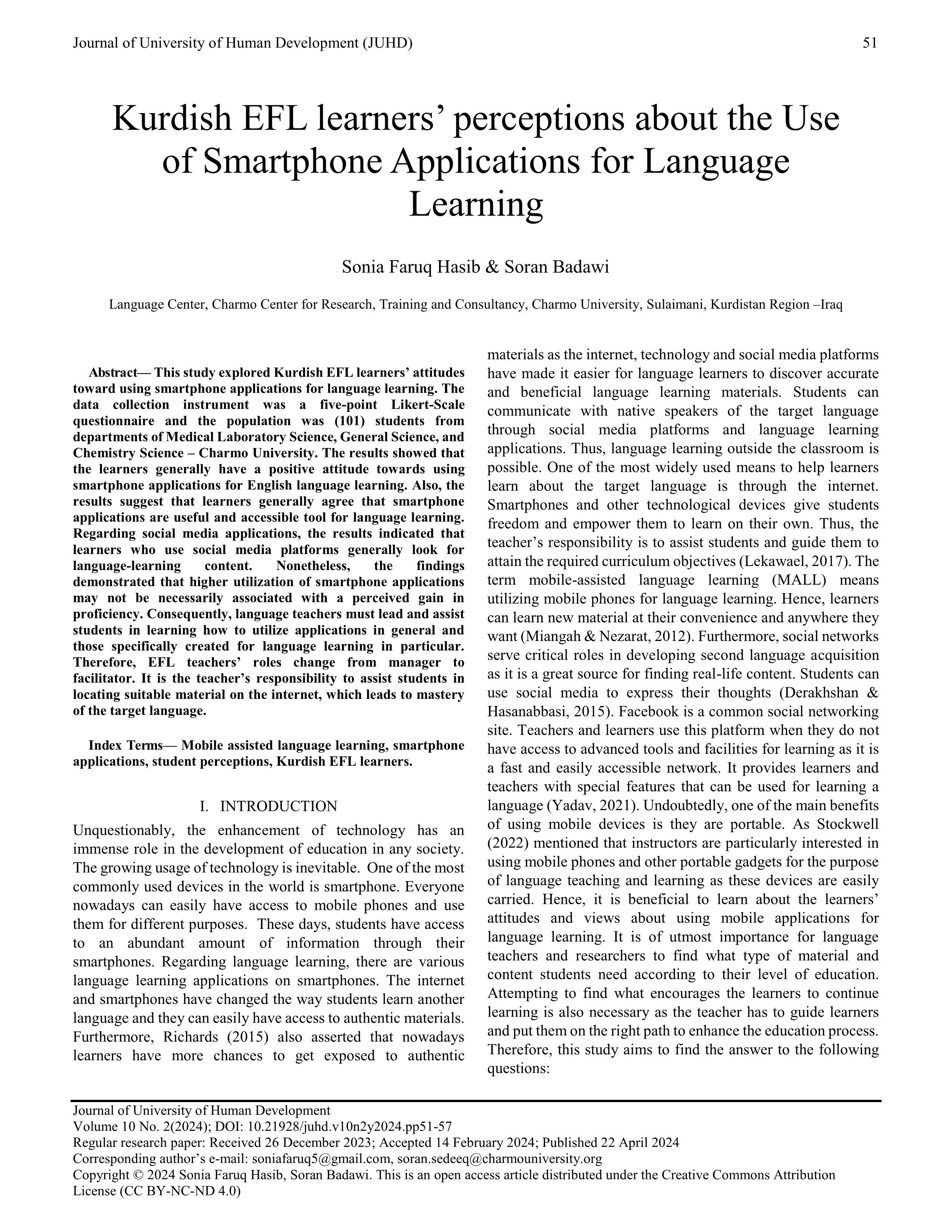Kurdish EFL learners’ perceptions about the Use of Smartphone Applications for Language Learning
DOI:
https://doi.org/10.21928/juhd.v10n2y2024.pp51-57Keywords:
Mobile assisted language learning, Smartphone applications, Student perceptions, Kurdish EFL learnersAbstract
This study explored Kurdish EFL learners’ attitudes toward using smartphone applications for language learning. The data collection instrument was a five-point Likert-Scale questionnaire and the population was (101) students from departments of Medical Laboratory Science, General Science, and Chemistry Science – Charmo University. The results showed that the learners generally have a positive attitude towards using smartphone applications for English language learning. Also, the results suggest that learners generally agree that smartphone applications are useful and accessible tool for language learning. Regarding social media applications, the results indicated that learners who use social media platforms generally look for language-learning content. Nonetheless, the findings demonstrated that higher utilization of smartphone applications may not be necessarily associated with a perceived gain in proficiency. Consequently, language teachers must lead and assist students in learning how to utilize applications in general and those specifically created for language learning in particular. Therefore, EFL teachers’ roles change from manager to facilitator. It is the teacher’s responsibility to assist students in locating suitable material on the internet, which leads to mastery of the target language.
References
Abdullah, Z. H. A. (2020). The Impacts of Social Media on Kurdish EFL Students' English Language Proficiency. Journal of Tikrit University for Humanities, 27(5), 89-105. https://doi.org/10.25130/jtuh.27.5.2020.23
Al Bajalani, F. R. H. (2018). The Impact of Mobile Assisted Language Learning on Developing Kurdish EFL Students’ Speaking Sub-skills at Koya University Paiman Zorab Azeez, Lecturer Salahaddin University-Erbil. Journal of Raparin University-Vol, 5(15), 143.
Aparicio, M., Bacao, F., & Oliveira, T. (2016). An e-learning theoretical framework. An e-learning theoretical framework, Educational Technology & Society, (1), 292-307.
Azeez, P. Z., & Al Bajalani, F. R. (2018). Effects of Mobile Assisted Language Learning on Developing Kurdish EFL Students: Listening Sub Skills at Koya University. Koya University Journal of Humanities and Social Sciences, 1(1), 85-95. https://doi.org/10.14500/kujhss.v1n1y2018.pp85-95
Bensalem, E. (2018). The impact of WhatsApp on EFL students' vocabulary learning. Arab World English Journal (AWEJ) Volume, 9. http://dx.doi.org/10.2139/ssrn.3150707
Burston, J. (2014). MALL: The pedagogical challenges. Computer Assisted Language Learning, 27(4), 344-357. https://doi.org/10.1080/09588221.2014.914539
Chen, X. (2016). Evaluating language-learning mobile apps for second-language learners. Journal of Educational Technology Development and Exchange (JETDE), 9(2), 3. https://doi.org/10.18785/jetde.0902.03
Darsih, E., & Asikin, N. A. (2020). Mobile Assisted Language Learning: Efl learners’ perceptions toward the use of mobile applications in learning English. English Review: Journal of English Education, 8(2), 183-194. https://doi.org/10.25134/erjee.v8i2.2999
Derakhshan, A., & Hasanabbasi, S. (2015). Social networks for language learning. Theory and Practice in Language Studies, 5(5), 1090. http://dx.doi.org/10.17507/tpls.0505.25.
Heil, C. R., Wu, J. S., Lee, J. J., & Schmidt, T. (2016). A review of mobile language learning. https://doi.org/10.4995/eurocall.2016.6402
Lekawael, R. F. J. (2017). The impact of smartphone and internet usage on English language learning. English Review: Journal of English Education, 5(2), 255-262. https://doi.org/10.25134/erjee.v5i2.540
Little, D. (1997). Language awareness and the autonomous language learner. Language awareness, 6(2-3), 93-104.applications: Trends, challenges, and opportunities. The EuroCALL Review, 24(2), 32-50. https://doi.org/10.1080/09658416.1997.9959920
Miangah, T. M., & Nezarat, A. (2012). Mobile-assisted language learning. International Journal of Distributed and Parallel Systems, 3(1), 309. https://doi.org/10.5121/ijdps.2012.3126.
Metruk, R. (2021). The use of smartphone English language learning apps in the process of learning English: Slovak EFL students’ perspectives. Sustainability, 13(15), 8205. https://doi.org/10.3390/su13158205
Nalliveettil, G. M., & Alenazi, T. H. K. (2016). The impact of mobile phones on English language learning: Perceptions of EFL undergraduates. Journal of language teaching and research, 7(2), 264. http://dx.doi.org/1015707/jltr.0702.04
Nuri, R. B. M., Aziz, A. R., Saeed, K. A., Tofiq, S. K., & Ahmed, S. S. (2021). Pedagogical Effects of Social Media on Iraqi Kurd EFL learners. Arab World English Journal (AWEJ). DOI: https://dx.doi.org/10.24093/awej/call7.15
Reinhardt, J. (2020). Metaphors for social media‐enhanced foreign language teaching and learning. Foreign Language Annals, 53(2), 234-242. https://doi.org/10.1111/flan.12462
Richards, J. C. (2015). The changing face of language learning: Learning beyond the classroom. Relc Journal, 46(1), 5-22. https://doi.org/10.1177/0033688214561621
Sadq, K. A., Sulaiman, S. H., & Ramadan, A. I. (2021). Facebook as an Online Tool for Learning English among Private Institutes’ Students in Kurdistan. Polytechnic Journal of Humanities and Social Sciences, 2(2), 11-17. https://doi.org/10.25156/ptjhss.v2n2y2021.pp11-17
Stockwell (2022). Mobile assisted language learning: concepts, contexts, and challenges. Retrieved from https://www.google.iq/books/edition/Mobile_Assisted_Language_Learning/XSZTEAAAQBAJ?hl=en&gbpv=1&dq=mobile+assisted+language+learning&printsec=frontcover
Thedpitak, A., & Somphong, M. (2021). Exploring Thai EFL learners’ attitudes toward using mobile applications for language learning. Learn Journal: Language Education and Acquisition Research Network, 14(1), 370–398.
Uzunboylu, H., & Ozdamli, F. (2011). Teacher perception for m‐learning: scale development and teachers' perceptions. Journal of Computer assisted learning, 27(6), 544-556. https://doi.org/10.1111/j.1365-2729.2011.00415.x
Yadav, M. S. (2021). Role of social media in English language learning to the adult learners. International Journal of Linguistics, Literature and Translation, 4(1), 238-247.
https://doi.org/10.32996/ijllt.2021.4.1.25
Yang, J. (2013). Mobile assisted language learning: review of the recent applications of emerging mobile technologies. English Language Teaching, 6(7), 19-25. doi:10.5539/elt.v6n7p19.

Downloads
Published
How to Cite
Issue
Section
License
Copyright (c) 2024 Sonia Faruq Hasib, Soran Badawi

This work is licensed under a Creative Commons Attribution-NonCommercial-NoDerivatives 4.0 International License.


